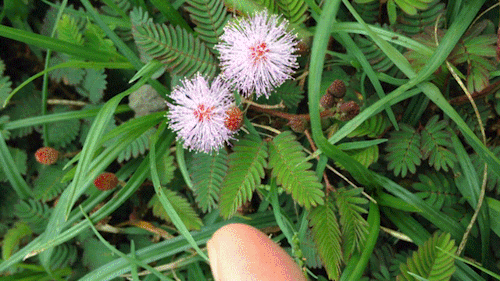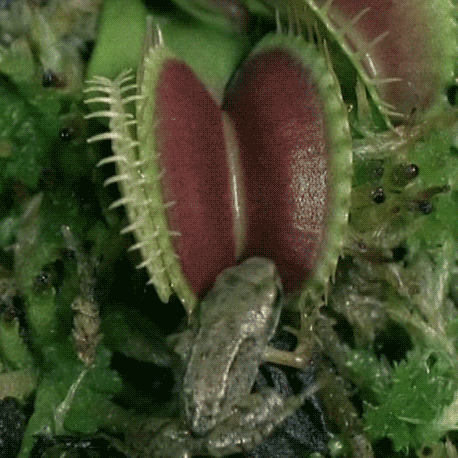Photo via Flickr user David Goehring
Officials in the United States government have dusted off that old partisan debate about abortion and put it back in the spotlight. With yet another budget standoff looming, the government might shut down on October 1, and it all might come down to a difference of opinion about whether a cluster of cells has rights. And according to an article in June's Scientific American, we're only just beginning to learn exactly what a fetus can feel and when.But you know what definitely can feel? Plants, at least according to biologist Daniel Chamovitz, dean of Life Sciences at Tel Aviv University in Israel, and author of the book What a Plant Knows.We reached out to Chamovitz to find out if one of those things plants can feel is pain, because we figured if they could, that would really shake up the whole abortion debate, not to mention add a new dimension to veganism. VICE: I'm looking at a video of a plant called mimosa pudica that can obviously feel. Someone touches it, and the leaves close up…
VICE: I'm looking at a video of a plant called mimosa pudica that can obviously feel. Someone touches it, and the leaves close up…
Daniel Chamovitz: I'm actually touching a mimosa as we talk.It feels that, right?
It's feeling it. I would even use the word "aware," but it doesn't care. A leaf knows when it's been cut, and it will respond, but it's not getting a complex, like 'oh my god. What happens to me if this happens again?'Is a mimosa different from other plants?
Mimosa, and also the venus flytrap have a specific organ for movement called a pulvinus. Other plants don't have that. But the way that a pulvinis reacts to touch is the same way that a branch reacts to touch at the molecular level.Would it frustrate the plant if you kept it from moving?
What you can do is, there are certain drugs—human drugs—that you can put on a mimosa [Note: the particular drugs that can do this are anesthetics like methoxyflurane, chloroform, halothane, enflurane and sevoflurane]. When you put them on the mimosa and touch it, it can't close anymore.Have scientists done anything else to torture these plants?
You know how if you apply an electric shock to your leg, it'll jump? You can cause a mimosa or a venus fly trap to close by putting electrodes on it, and send an electric charge across a leaf.It must hate that, right?
It's very easy to become anthropocentric and say 'Oh, it hurts!' But what I see is—and there's nothing spiritual about this at all—the unity of biology. All of biology uses electricity—what are called depolarizations. This is an ancient biological mechanism. Our nerves do that.Do plants that aren't mimosas or venus flytraps have electrical signals?
We know that when aphids attack leaves, it elicits an electric signal in plants that goes from leaf to leaf to signal it to start protecting itself. It's propagated very similarly to the way it's propagated along a nervous system. And they do this all without a neural system. The take-home message is that neural systems are one way to process information, not the only way.Right, and isn't sensing damage, even without a neural system, essentially pain?
The idea that damage has to be pain is mistaken. We feel pain because we have specific types of receptors called nociceptors which are programmed to respond to pain, not to touch. People can have genetic malfunctions where they feel pressure but never feel pain because they don't have pain receptors.But you said plants are 'aware.' So aren't they cognizant of this damage?
No. I refuse to use the word cognition. We have no understanding of what cognition is. None whatsoever. Plants are not cognizant. When we cut a leaf, we assume that the plant is suffering. But that's our own anthropomorphism about what's going on.So they might not be in pain, but they're struggling.
All organisms try to maintain homeostasis, and they'll do anything to have that. But whether there is suffering? That's a definition that we put on things. Let's say you have an elm tree on top of a mountain, and the same elm tree in a valley. On top of a [windy] mountain it's going to be short with few branches, few leaves, and a thick trunk. If it stayed at the same height with the same number of branches, it would be blown over. So we know that plants actively respond to the wind by inhibiting vertical growth, and by increasing their girth. It's an active response. It's not like it's responding to damage. It's changing its own response in order to survive. Can a plant learn?
Can a plant learn?
Plants have memories. They store and recall information, but they won't go talk to their psychiatrist about it. The clearest example would be a venus flytrap. The way a venus flytrap closes is that it has these huge hairs—filaments—along its big open lobe. It looks like two leaves, but it's one leaf. And when a bug comes along and catches two of those hairs, it'll close. If it only touches one, it won't. It touches one, keeps crawling, touches the second. If it touches it within 20 seconds, it'll close. If it's within 20 seconds, it's a big bug, and it's worth the energy to close. If it's a longer time, maybe it's two little things, and it's not worth the energy to close. It only wants to eat something that's big.That's not really much of a memory, is it?
Short-term memory! Within several seconds, it's gone. That's what happens here. The first hair gets touched. It'll remember for 20 seconds; after that it forgets that it's been touched.So, if I follow you, plants really do feel, not metaphorically, but really. They just can't feel pain. Right?
Plants don't have pain receptors. Plants have pressure receptors that allow them to know when they're being touched or moved—mechanoreceptors. It's a specific nerve cell.And to be clear, am I right that a plant knows it's being damaged?
You can definitely kill a plant, but it doesn't care.Follow Mike Pearl on Twitter.
Advertisement

Daniel Chamovitz: I'm actually touching a mimosa as we talk.It feels that, right?
It's feeling it. I would even use the word "aware," but it doesn't care. A leaf knows when it's been cut, and it will respond, but it's not getting a complex, like 'oh my god. What happens to me if this happens again?'Is a mimosa different from other plants?
Mimosa, and also the venus flytrap have a specific organ for movement called a pulvinus. Other plants don't have that. But the way that a pulvinis reacts to touch is the same way that a branch reacts to touch at the molecular level.Would it frustrate the plant if you kept it from moving?
What you can do is, there are certain drugs—human drugs—that you can put on a mimosa [Note: the particular drugs that can do this are anesthetics like methoxyflurane, chloroform, halothane, enflurane and sevoflurane]. When you put them on the mimosa and touch it, it can't close anymore.
Advertisement
You know how if you apply an electric shock to your leg, it'll jump? You can cause a mimosa or a venus fly trap to close by putting electrodes on it, and send an electric charge across a leaf.It must hate that, right?
It's very easy to become anthropocentric and say 'Oh, it hurts!' But what I see is—and there's nothing spiritual about this at all—the unity of biology. All of biology uses electricity—what are called depolarizations. This is an ancient biological mechanism. Our nerves do that.Do plants that aren't mimosas or venus flytraps have electrical signals?
We know that when aphids attack leaves, it elicits an electric signal in plants that goes from leaf to leaf to signal it to start protecting itself. It's propagated very similarly to the way it's propagated along a nervous system. And they do this all without a neural system. The take-home message is that neural systems are one way to process information, not the only way.Right, and isn't sensing damage, even without a neural system, essentially pain?
The idea that damage has to be pain is mistaken. We feel pain because we have specific types of receptors called nociceptors which are programmed to respond to pain, not to touch. People can have genetic malfunctions where they feel pressure but never feel pain because they don't have pain receptors.But you said plants are 'aware.' So aren't they cognizant of this damage?
No. I refuse to use the word cognition. We have no understanding of what cognition is. None whatsoever. Plants are not cognizant. When we cut a leaf, we assume that the plant is suffering. But that's our own anthropomorphism about what's going on.
Advertisement
All organisms try to maintain homeostasis, and they'll do anything to have that. But whether there is suffering? That's a definition that we put on things. Let's say you have an elm tree on top of a mountain, and the same elm tree in a valley. On top of a [windy] mountain it's going to be short with few branches, few leaves, and a thick trunk. If it stayed at the same height with the same number of branches, it would be blown over. So we know that plants actively respond to the wind by inhibiting vertical growth, and by increasing their girth. It's an active response. It's not like it's responding to damage. It's changing its own response in order to survive.

Plants have memories. They store and recall information, but they won't go talk to their psychiatrist about it. The clearest example would be a venus flytrap. The way a venus flytrap closes is that it has these huge hairs—filaments—along its big open lobe. It looks like two leaves, but it's one leaf. And when a bug comes along and catches two of those hairs, it'll close. If it only touches one, it won't. It touches one, keeps crawling, touches the second. If it touches it within 20 seconds, it'll close. If it's within 20 seconds, it's a big bug, and it's worth the energy to close. If it's a longer time, maybe it's two little things, and it's not worth the energy to close. It only wants to eat something that's big.That's not really much of a memory, is it?
Short-term memory! Within several seconds, it's gone. That's what happens here. The first hair gets touched. It'll remember for 20 seconds; after that it forgets that it's been touched.So, if I follow you, plants really do feel, not metaphorically, but really. They just can't feel pain. Right?
Plants don't have pain receptors. Plants have pressure receptors that allow them to know when they're being touched or moved—mechanoreceptors. It's a specific nerve cell.And to be clear, am I right that a plant knows it's being damaged?
You can definitely kill a plant, but it doesn't care.Follow Mike Pearl on Twitter.
